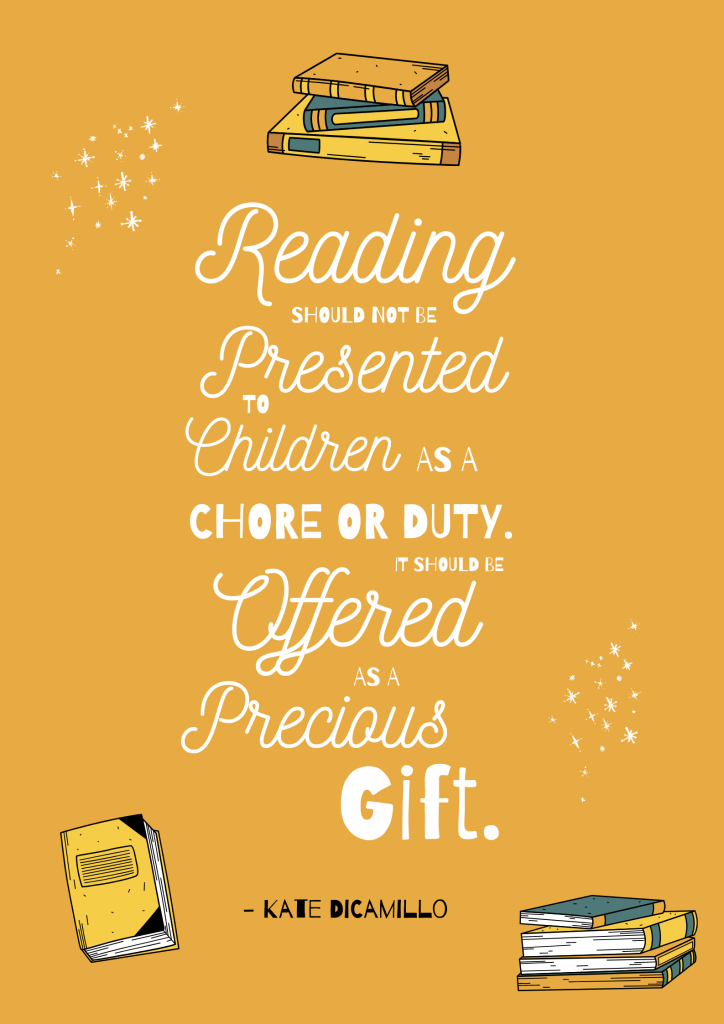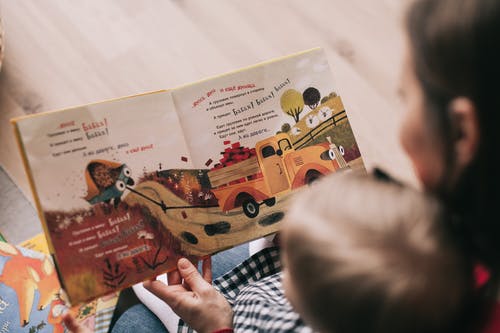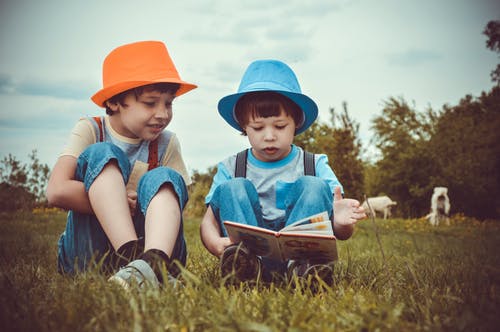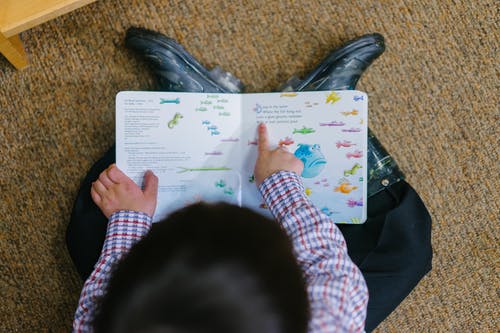Did you know that children develop more rapidly during the first 5 years of their lives than at any other time? 
It’s true. That’s why this crucial period is known as ‘the foundation years.’
If you nurture certain skills during these first 5 years, you create a solid foundation from which your child can build on for the rest of their life. Think of it as giving them a head start to learning.
Talking about starting right, literacy is one of those skills that both our Nursery and parents nurture in those early years. Why literacy? Because reading and writing are the fundamentals of early education, not to mention that they crop up multiple times every single day. From reading road signs and writing shopping lists to learning a new language, literacy is a skill that is vital for everyone.
But why exactly is reading so important during a child’s early years?
Reasons why reading is important for young children
1. Reading helps to develop a young child’s brain
Vital connections in the brain are made very early in life and when stimulated, these form the basis of all future learning and intellectual ability. To put this simply, reading to your children at a young age stimulates these brain cells and each time it strengthens them and they form connections with even more brain cells. Stimulating your young child’s brain cells through these early experiences will help them to become better listeners, readers, and communicators as well as instilling a lifelong love of learning.
2. Reading fosters a love of learning which leads to higher grades
Talking about that lifelong love of learning, that is why reading is important at such an early age. When children learn to read at an early age, they have greater general knowledge, a wider range of vocabulary, they are more fluent readers, and they have improved attention spans and better concentration. As well as stronger oral and literacy skills, proficiency in reading also allows young children to understand more, to learn more, and to become competent researchers. As you can imagine, all of these are skills that help young children perform higher in school.

3. Reading has many psychological benefits for young children
Early reading ignites creativity, sparks curiosity, and stimulates the imagination in young children. Often, this leads to role-play as children grow which helps to develop other skills such as empathy, problem-solving, and morality. While these are significant benefits to young children, the biggest psychological benefit is how reading helps to grow self confidence and independence from such an early age. The simple act of taking time out of the day to read to your baby or sit down with your child helps to promote greater maturity and discipline. These are all so essential when it comes to your child learning to read in a school setting as sometimes the psychological pressure can be too much.
4. Reading helps boost a young child’s self-confidence
As we mentioned above, there is psychological pressure when learning to read in school. Children have social awareness too, from a young age, so imagine how difficult it must be to see other children picking it up quickly if they are struggling? This can have serious implications for their self-image as they grow and this is why reading is important. If you read with your children early on and help them to learn at their own pace in a fun setting, you can foster a love of reading and help them to become competent and confident at it before having to do it in front of others.
5. Reading will help young children become better writers and communicators
When you think about why reading is important, you may think of the obvious benefits such as expanding your vocabulary and knowledge but what many people don’t realise is that for young children, it develops so many other skills too. The sooner a child learns to read, the more opportunities they have to encounter the written word. More exposure then leads to better spelling, grammar, writing, and oral communication.

Reading is an area within our whole Nursery that we value with the upmost importance. Below outline some ways we have worked towards improving our provision linked to reading and ensuring our very young learners develop a love of books and all they have to offer. Within Nursery you will not be expected to see young children reading a book independently, it is our job to ignite the interest and passion and the drive for the children to want to be able to learn to read. Early ‘reading’ in our Nursery may take the form of the following:
· Ensure we have a range of high quality texts from classic stories to super fascinating non-fiction books.
· Have a dedicated Library space within our setting that is organised and easy to use for all of our children, staff and families.
· Ensure our book corner within our Nursery setting is inviting, snug, calm and comfortable to allow children the time that is needed to enjoy either looking at the pictures in the book or sharing with an adult.
· Within the book corner we have a high quality selection of books for the children to have free access to.
· Ensure books are in most if not all areas of the nursery to show to the children that they can link between their play interests and imagination.
· Allow children to access books in our outdoor area, both within the main Nursery outdoor area but also out school Allotment and Forest School. We are forever making reading dens in our forest area or using them to find out more information about the insects we find!
· We listen to stories via different media so the children are encouraged and know that they can listen to a story in a number of different ways for example CD
· Ensure each and every day the children have the opportunity to listen to a story that includes gesture, laughs, repetition, sounds and even props. This will be within our group time session each day. Our staff are very highly skilled at reading and sharing stories to really bring them alive. The children really thrive on this experience each and every day.
· We have a home school lending library. Here each week the children get to pick a book of their choice to take home for them to enjoy with their family members.
- We have Beechdale Little lending Library. This is a small library that is positioned outside of our front door for parents and children to help themselves to books.



· We give family members regular hints and tips on effective ways to share stories with our young children and the importance of doing so. This is shared via our communication method on Class Dojo.
· Staff are sometimes filmed sharing a story and this is shared via class dojo this provides the parents/families with the opportunity to see how we read a story in Nursery or for the children to repeatedly watch their key worker share a favorite story which is fantastic!
· The children are encourage to bring in a favorite story from home as a special reward when our monster point chart is full.
· Stories are often used as a ‘hook’ to learning and to generate interest in an area of learning that the children find of interest.
· We often use a technique called Helicopter Stories to shared stories with the children. This encourages the children to use their imagination and invent their own stories. Allowing them to begin to see how a story is developed and structured.
· We have regular visits to the local Library in Consett, at least once a term if not more.
· We are always on the lookout for guest authors into school, which the children find fascinating.
We also invite travelling plays or small theatre companies into school.
· Every Christmas the story put on a Christmas show that is based on a fun Christmas story!
· This year we have a Book advent for the children. So as we count down to Christmas each day a child will get to open a door and take a book home.
· Books are often given as prizes or incentives.

If you would like more information or ideas for how to best support early reading please see the web links below:
BookTrust: Getting children reading | BookTrust

Early Phonics is also a key part of our Nursery Curriculum, what is early phonics I may hear you wonder and what do we do in Nursery;
Our early phonic activities are play based and concentrate on developing children’s speaking and listening skills, phonological awareness and oral blending and segmenting through practical activities. These activities are intended to be part of our broad and rich language curriculum that has speaking and listening at its centre and provides an environment rich in print and abundant in opportunities to engage with books.
The early phonic activities we offer pave the way for children to make a good start in reading and writing. These activities focus on general sound discrimination by listening to and discussing environmental sounds, instrumental sounds, body percussion, rhythm and rhyme, voice sounds, hearing initial sounds in words and orally blending and segmenting simple words. We encourage activities linked to listening out for and clapping syllables in words, we look closely each and every day at the children’s names and the children quickly identify the initial sound of their own name and often those of their friends. As the year progresses for the children we introduce rhyme activities which take the form of ‘silly’ rhymes or the use of our magic rhyme hat! All super fun and engaging for the children. These activities are based around play and the children’s interests are still at the heart of all we do. We offer weekly small group sessions for those who need additional support for their speech and language development. These are often guided by a speech and language therapist, in partnership with parents and supported by all staff when the children are engaging in the children on a daily basis in the environment.
A fantastic way to support with early phonics at home is to sing and share Nursery Rhymes together… sing, sing, sing…
Nursery Rhymes and Songs – A to Z – BBC Teach
If you have any questions at all about the above information please do not hesitate to contact us in school.











